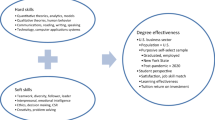Abstract
The main function of Higher Educational Institutions (HEIs) is to produce skilled and knowledgeable workforce who are able to not only function with minimal guidance but also to contribute effectively to the hiring organizations. Many studies have indicated that most HEIs have somewhat similar course content and thrived at producing students with good academic achievement. But what differentiated them from one another is their ability to develop knowledge workers with the right employability skills or ‘soft skills’ such as communication, problem-solving, interpersonal and other skills deemed important as the foundations by which they require to function at work regardless of the nature of employment. This paper reports findings of a large-scale study looking into the soft skills attainment of Malaysian HEI graduates. A quantitative survey design was employed whereby data were obtained through the administration of an instrument called the Malaysian Soft Skills Scale (My3S). My3S consists of 180 items covering seven elements namely Communications, Critical Thinking and Problem Solving, Teamwork, Moral and Professional Ethics, Leadership, Life Long Learning and Entrepreneurial aspects. The mean scores for the seven My3S subscales were found to be between 6.3 and 7.8 from the maximum possible score of 10. Specifically, comparisons were made between graduates of public and private institutions with respect to the seven elements. Findings of the study suggest that, in general, students of public HEIs scored higher in all seven skills. With respect to gender, male students scored higher than female students in all elements except for teamwork skills and moral and professional ethics. A comparison between fields of study showed that for both types of HEIs, technical students scored the highest in all skills except for moral and professional ethics. Based on the findings of this study, it is suggested that in addition to offering specific courses to improve soft skills attainment, HEIs need to embed soft skills in their academic curricula.
Similar content being viewed by others
References
Ab. Rahim, B., Shamsiah, M., & Ivan, H. (2007). Employability skills: Malaysian employers perspectives. The International Journal of Interdisciplinary Social Sciences, 2(1), 263–274.
Chapman, K. (2006). Undergrads to learn soft skills from next month. The Star. Retrieved from http://thestar.com.my/news/story.asp?file=/2006/6/13/nation/14517221&sec=nation.
Dawson, L. M. (1997). Ethical differences between men and women in the sales profession. Journal of Business Ethics, 16(11), 1143–1152.
Economic Planning Unit. (2007). Malaysia and the knowledge economy: Building a world-class higher education system. Report no. 40397-MY, Human Development Sector, East Asia and Pacific Region. World Bank, Washington DC.
Gamble, B. (2006). Teaching life skills for student success. Techniques: Connecting Education and Careers, 81(6), 40–41.
Gurvinder Kaur, G. S., & Sharan Kaur, G. S. (2008). Malaysian graduates employability skills. UNITAR e-journal, 4(1), 14–44.
Knight, P. T., & Yorke, M. (2003). Employability and good learning in higher education. Teaching in Higher Education, 8(1), 3–16.
Kruss, G. (2004). Employment and employability: Expectations of higher education responsiveness in South Africa. Journal of Education Policy, 19(6), 673–689.
Lim, H. E., & Normizan, A. B. (2004). Unemployment duration of graduates of Universiti Utara Malaysia: The impact of English language proficiency. Malaysia Journal of Economic Studies, 41(1–2), 1–20.
Malaysia has 60,000 graduates unemployed. (2005). Retrieved from http://www.malaysia-today.net/Blog-e/2005/11/malaysia-has-60000-undergraduates.htm.
Marchant, J. (2010). Should schoolchildren be typecast into science? NewScientist. Retrieved from http://www.newscientist.com/article/mg20827833.100-should-schoolchildren-be-typecast-into-science.html.
McCrimmon, M. (2010). Are women better leaders than men? Management-issues. Retrieved from http://www.management-issues.com/2010/9/7/opinion/are-women-better-leaders-than-men.asp.
Ministry of Higher Education, Malaysia. (2006). Modul pembangunan kemahiran insaniah (soft skills) untuk Institusi Pengajian Tinggi Malaysia [Soft skills module for Higher Educational Institutions in Malaysia]. Serdang: Penerbit Universiti Putra Malaysia.
Mohammad, A., Zurina, Z., & Nursilah, A. (2007). Employability of Islamic studies graduates in Malaysia. Nilai: USIM.
Norizan, A. R., Hazita, A., Sallehhudin, A. A. M., Wong, F. F., & Azizah, Y. (2006). The quality and marketability value of local graduates: Perspectives from the Malaysian employers. Paper presented at 6th SEEAIR annual conference, Langkawi, Malaysia.
Nurita, J., Fatimah, P., Noor Akmar, O., & Hanifah, M. (2010). Factors influencing internal and external employability of employees. Retrieved from http://astonjournals.com/manuscripts/Vol2010/BEJ-11_Vol2010.pdf.
Ong, E., Sharma, R., & Heskin, K. (2003). Generic skills assessment in a Malaysian tertiary institution: A survey of stakeholders’ perceptions. Journal of South East Asian Association for Institutional Research, 1(2), 33–42.
Radin Umar, R. S. (2009). Graduate employability: University-industry relationship and the role of Ministry of Higher Education. Keynote speech at Seminar on Employability—Enhancing graduate employability: Issues, concerns and the way forward. Putrajaya, Malaysia. Retrieved from http://www.alumni.upm.edu.my/employability/papers/001_keynote01_prof_dato_ir_dr_radin.pdf.
United States Department of Labor (2007). Soft skills: The competitive edge. Retrieved from http://www.dol.gov/odep/pubs/fact/softskills.htm.
Wan Irham, I., Shafinah, M. S., & Azhari, M. H. (2006). Utilizing needs analysis study to determine the current English language needs in the industrial sector. Wahana Akademik Journal, 5, 75–80.
Yorke, M., & Harvey, L. (2005). Graduate attributes and their development. New Directions for Institutional Research, 128, 41–58.
Author information
Authors and Affiliations
Corresponding author
Rights and permissions
About this article
Cite this article
Abdul Karim, A.M., Abdullah, N., Abdul Rahman, A.M. et al. A nationwide comparative study between private and public university students’ soft skills. Asia Pacific Educ. Rev. 13, 541–548 (2012). https://doi.org/10.1007/s12564-012-9205-1
Received:
Revised:
Accepted:
Published:
Issue Date:
DOI: https://doi.org/10.1007/s12564-012-9205-1




